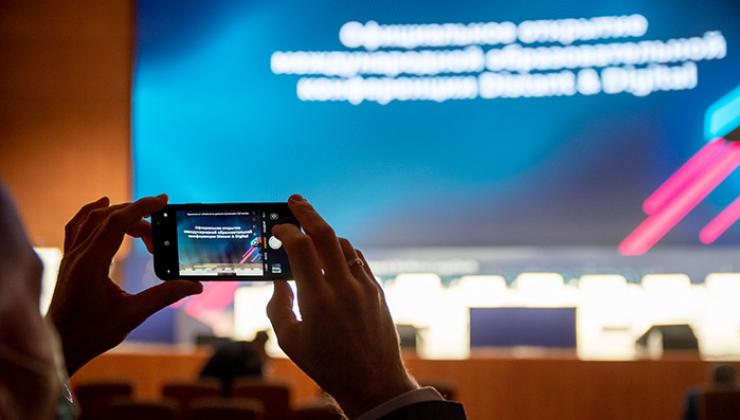
Results of the Distant & Digital International Educational Conference
The Distant & Digital, which is the largest International Educational Conference in the CIS, was concluded in Moscow. Traditionally, the main topics were intellectual property, digital transformation and the latest legal technologies. The event brought together more than 200 experts, representatives of the creative economy.
The business program was made up of four tracks: "Create", "Manage", "Protect", LegalTech. All of them were devoted to various aspects of the real economy, including issues of the circulation of intellectual property rights, judicial and extrajudicial digital tools for protecting intellectual property, as well as trends in the field of legal technologies.
The participants of the plenary session "Rights of the Consumer of an Intellectual Product" decided how to make a competent subject of legal relations out of a simple consumer of content. Igor Drozdov, Chairman of the Board of the "Skolkovo" Foundation, shared his observations: "When interacting with the world of things, we usually do not read contracts, but we know firsthand and intuitively understand our rights and obligations from the Federal Law "On Protection of Consumer Rights". However, there are no such protective mechanisms on the Internet, ecosystems and the metaverse, they have to be developed".
At the plenary session "Databases vs data without databases", the participants unraveled the tangle of contradictions between the owners of social networks, classifieds, datasets and big data specialists. The experts agreed that regulation should serve to create a successful commercial model of data circulation. "Such a powerful information processing tool as AI is always ultimately aimed at the commercialization of data. That is why now the priority is not to expand the list of grounds for free use, but to develop general rules for the use of commercial", said Andrey Krichevsky, Chairman of the RSPP Committee on Intellectual Property and Creative Industries.
The "Create" track was devoted to the initial stages of the life cycle of a creative production. Optimal strategies for the legal registration of creative production were discussed. During the discussion "Legal problems of creative "appropriation" of the territory: street art, public art, actionism", Maya Svistukhina, the Member of the Board of the Union of Creative Clusters, recalled that public art falls under the category of either decorative and monumental composition or small architectural form. In the first case, a lengthy approval procedure is assumed, in the second, a restriction is imposed - the building should not have a foundation and underground communications. All this comes into conflict with the direction of art of this type, based on spontaneous communication with the city and its inhabitants.
What is the most effective way to dispose of intellectual rights to a creative product? The "Manage" track focused on this issue. After all, without taking into account successful practices, it is difficult to choose the optimal model for monetizing content, to identify, evaluate and systematize the intangible assets of companies.
"Who are the information intermediaries today: do they have the right or do they observe it?" — Sergey Matveev, the President of the Federation of Intellectual Property spoke at this session, noting that the legislator needs to protect the rights of users and businesses that work with platforms: "In the genetics of platforms, there is initially a desire for monopolization. If you haven't grabbed and kept the client, the user, the traffic, you're not a platform. Keep everyone inside your ecosystem, manage streams and data! It is no longer an intermediary, but a different economic entity".
The discussions of the "Protect" track were built around the strategies of judicial, pre-trial or technical protection of the results of intellectual activity. One of the questions concerned the so-called parallel creativity. Is it possible that two people independently came up with an idea and expressed it in similar ways, for example, in a novel or a painting? And which side will the court take? This problem was discussed at the master class of Konstantin Leontiev, the Deputy General Director of the Omega Law Firm and Associate Professor of the Digital IP Scientific and Educational Center.
According to the expert, a typical example of parallel creativity is "Harry Potter" by J.K. Rowling and Dmitry Yemets' book "Tanya Grotter", published in Russia after it: "The Russian court acted according to scholastic principles: here is a boy, and here is a girl, here is Harry, and here is Tanya, Harry flies on a broomstick, and Tanya on a dragon. But the approach of the Dutch court is based on both copyright and the fight against unfair competition. For the court, the general similarity was enough and the fact that "Tanya" came out immediately after "Harry", parasitizing on his commercial success".
The LegalTech track hosted a series of discussions and master classes on the automation of legal processes, the transformation of the legal function and the rethinking of the role of a lawyer in the digital economy and remote work. One of the key issues on the agenda of legal innovations is the personnel, said Anton Pronin, Director for Corporate Innovations and Head of the Legal Technologies Practice (LegalTech) of the "Skolkovo" Foundation's Information Technologies Cluster: "The strongest driver of digital transformation is the personality of the leader of digital transformation, his/her desire to develop, grow, the mental changes of that person".
A special place was taken by the competition of legal startups LegalTech Most Creative. Five projects reached the finals, including the Cosmovisa service, which allows you to challenge the transaction through a chargeback, the PLATFORMA litigation financing service, the UR-LI solution for streaming scoring and receivables management solution, the SPLIT FAMILY divorce services marketplace and the Privacy Automation Tool developed by KPMG, which allows you to automate the work with personal data in the company.
New partnerships and real deals have become another tradition of the Distant & Digital conference. This time, a cooperation agreement was signed between the Intellectual Property Center "Skolkovo" (IP Center "Skolkovo") and the National Association of Technology Transfer (NATT). On behalf of "Skolkovo", the document was signed by Anton Pushkov, the Managing Partner of the IP Center, and on behalf of the NATT - Alexey Filimonov, the Executive Director of the Association. The partners will combine their information and expert resources for joint educational and enlightenment projects, promotion of inventions and applied science.
The status of cybersport, the legal problems of franchising, discussions about the status of a well-known trademark, the transformation of the legal function and the increased role of information intermediaries – the problematic nodes raised at D&D will be discussed at further conferences and forums under the Distant & Digital and IPQuorum brands.
 Call us
Call us
 Write to us
Write to us

